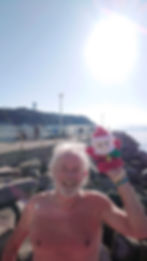LEARNING THE MEANING OF LOVE IN ROUGH WATER
- Joseph Polack
- Jan 1, 2025
- 4 min read
During my daily winter swim, I was caught in the Pacific's northern undercurrents along Fujisawa Bay.

The day was sunny, the wind icy, and the ocean calm on the surface. I was only a few hundred meters from the pier when a sudden change in the wind and shifting underwater currents slowed my swim even more. I began to swim in circles, unable to free myself from the underwater trap.
My only chance to escape the danger was to reach the pier's safety ladder before the incoming waves could smash me against the rocks.

The weather began to deteriorate even more. My attempts to free myself from the trap for almost half an hour left me increasingly exhausted. I needed help.

Though I could still see the lifebelt placed along the pier, there was no one to throw it to me. People were busy steering their fishing rods to the more peaceful side of the pier.
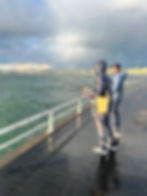
My cries for help were muffled by the rapidly increasing wind.
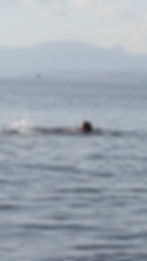
People were enjoying fishing on the other side of the pier, but I was slowly drifting away from the security ladder.
The waves crashing into the sharp rocks protecting the pier from the storms were getting closer, and then they disappeared from my sight. My head was pushed under the surface by the waves again.

When I almost gave up hope of returning to the pier, frozen images from my youth began to pass through my mind. It was strange. Why was I thinking about my past as if it were the future?
Was I going to die almost 10,000 km away from the country of my birth? The country from which I had been exiled more than half a century ago.
Then, an even stranger thought entered my mind. I began to recall a poem written by an exiled Nicaraguan author named Gioconda Belli.

At first, it didn't make sense. I felt like my mind was starting to separate from my struggling body. As my body grew colder, my mind grew increasingly frantic.
Old memories flashing in my head brought familiar sounds back to life. I could hear the sounds of my past rustling in the wind.
I couldn't separate them anymore. My native Polish was fading into Swedish, the language spoken in the country where my daughter Akane Liv was born. Then Japanese, the language of my son Ken's birth country, magically merged with the sounds of Manhattan, where his daughter Mia was born.
Then, there was a long silence, followed by the sound of fish swimming in front of my face.
I no longer knew where I was or where I was drifting. My mind was losing track of time and space.
When I surfaced again, the ocean was slowly calming down. The winds had died already. I could breathe again.
A few minutes later, I managed to climb up the safety ladder. The rescue equipment had been replaced by fishing rods.
My bike was waiting for me on the other side of the pier. It was surrounded by fish still breathing heavily.
Suddenly, I heard the sound of a newborn baby. It was a sound that lived in my memory.
It was only a twenty-minute bike ride from the pier where my Swedish-born daughter Akane Liv gave birth to my granddaughter Sara at the local Fujisawa Hospital.
Then, the sound of the little girl faded away as soon as I fastened my helmet.
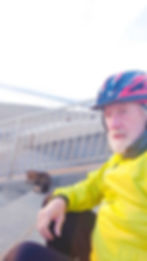
It felt like I was slowly returning to this side of life to share with my two granddaughters another of my unfinished stories about nurturing love in the rough times…
Gioconda Belli
"One Does not Choose"
One does not choose the country where one is born;
But one loves the country where one was born.
One does not choose the time to come into this world;
But one must leave a mark on one's time.
No one can evade one's responsibility.
No one can cover one's eyes, ears,
Be silent and cut one's hands.
We all have a duty of love to fulfill,
A story to be born
A goal to achieve.
We didn't choose the moment to come into this world:
Now, we can make the world in which it will be born and grow
The seed we brought with us.”
When my son Ken was born in Tokyo in 1982, he had no idea that he was the son of a former refugee father exiled from communist Poland, nor that in 2015, his own daughter, Mia, would be born in Manhattan.

Both Ken-Stanislaw and his older sister Akane Liv have celebrated birthdays in many different cultures since childhood.

It’s been over four decades since I held my months old son on my lap. Ken will be celebrating his 43rd birthday in January of 2025.
As a New Year's gift for my bilingual granddaughters Mia and Sara, I translated Gioconda Bella's poem into English and their parents translated it into Japanese [ジョコンダ・ベッリ 「人は選べない」[“One Does Not Choose”]
ジョコンダ・ベッリ
「人は選べない」
人は生まれる国を選べない。
しかし、生まれた国を愛する。
人はこの世に生まれる時期を選べない。
しかし、自分が生きた時間の痕跡を残さなければならない。
誰も自分の責任から逃れることはできない。
誰も目や耳をふさいだり、沈黙したり、 関係を断つことはでき ない。
私たちはみな、果たすべき愛の義務、 生まれるべき物語、 達成すべき目標を持っている。
私たちはこの世に生まれる瞬間を選べなかった。
しかし今、私たちは、持ってきた種が生まれ、
成長する世界を作ることができる”
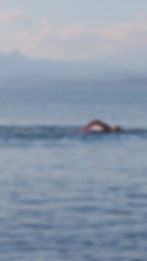
As usual, I started my celebration at sea on January 1 with my first swim in rough water this year:

The Pacific calmed down, the cold winds faded away, and beachgoers wished each other a Peaceful New Year of the Snake 2025…
